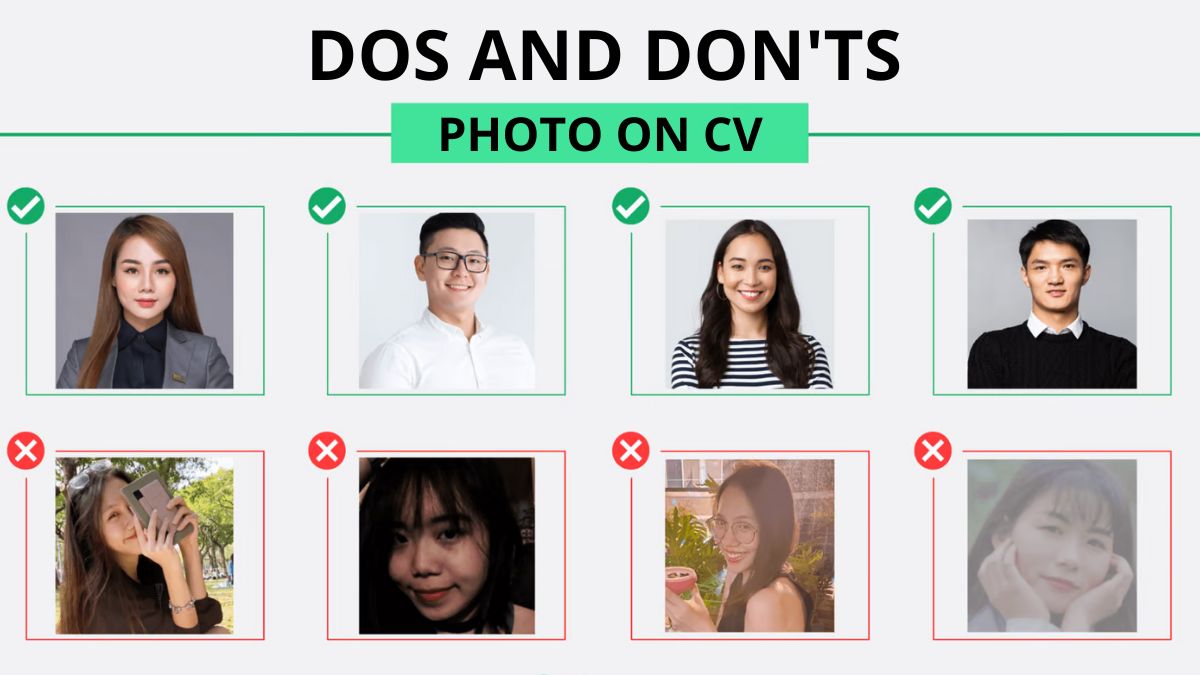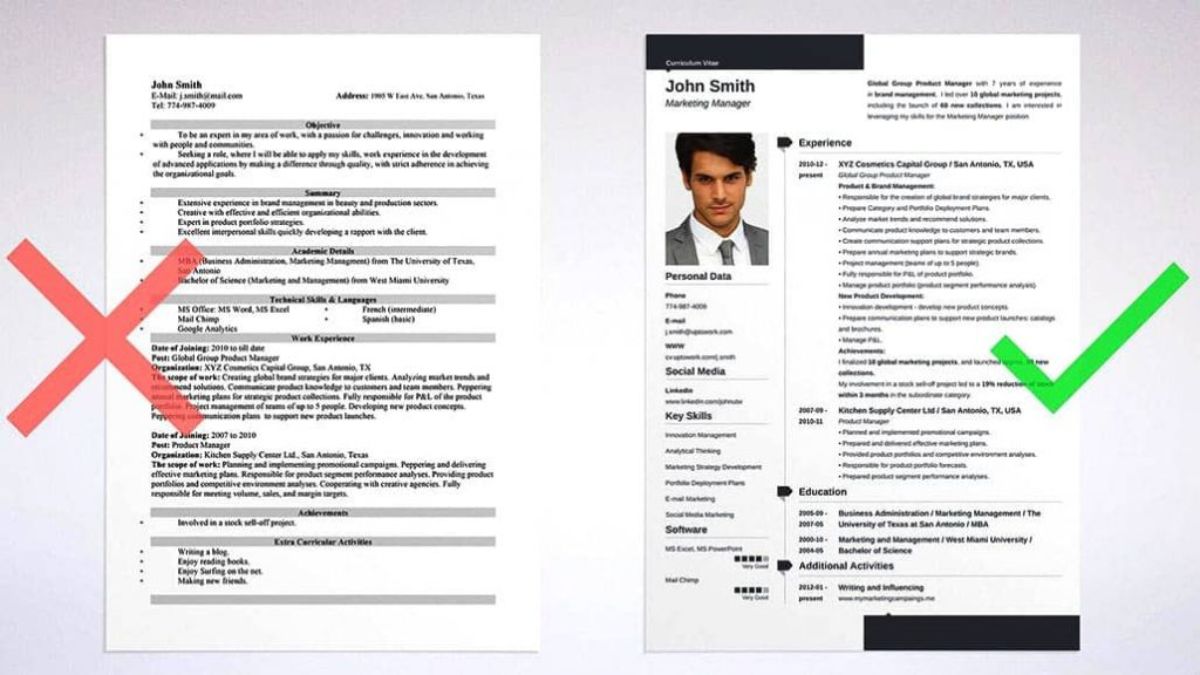Presenting personal information in your CV is not just a basic step but significantly influences your first impression with employers. Clear and professional personal information helps your CV stand out. In this article, EIV will share with you the dos and don’ts when writing personal information in your CV, helping you optimize your application to increase interview opportunities.
6 Types of Personal Information Required in CV

Essential personal information when writing a CV
When writing a CV, including complete and accurate personal information is crucial to ensure employers can easily contact you. Basic elements should include:
- Full name
- Phone number
- Residential address
- Email address
- Educational background
- Language proficiency: (If any)
Additionally, including links to your LinkedIn profile or personal portfolio is a plus, providing more information about your skills and experience. These elements not only help employers contact you easily but also reflect your professionalism.
Personal information in CV is essential for employers to easily contact you. During the screening process, they use this information to categorize and approach suitable candidates. Even if not selected immediately, personal information remains important as companies often store data of potential candidates. This can open new opportunities for you in the future.
Accurate personal information in CV helps employers easily contact and evaluate candidates. Similarly, for employers, having complete and accurate information about candidates is very important, especially when recruiting foreign candidates. With over 13 years of experience in recruiting and supplying foreign teachers with thoroughly verified profiles, helping individuals, educational units/organizations access suitable and quality candidates. Please contact EIV via hotline 028 7309 9959 to ensure access to excellent native teachers and optimize the recruitment process.
Discover Related Guides: Standard Teacher CV Structure: 5 Important Elements to Make a Good Impression
Things to Do When Presenting Personal Information in CV
When writing a CV, presenting personal information isn’t just about listing basic details but must demonstrate professionalism and suitability for job requirements. Here are some important points to ensure your personal information in CV is presented clearly and properly:
Full Name
Ensure your name is the first thing readers see when opening your CV. Place your name in a prominent position, using large and clear font size. Avoid using titles like “CV,” “Resume,” or “Job Application” to prevent distracting attention from your name.
Use a professional email address, for example, ngatran@gmail.com. Avoid using informal emails like congchuaori@yahoo.com or school emails. Gmail is often preferred over other platforms due to its popularity and high reliability.
Phone Number
Provide accurate and readable phone numbers. You can write in formats like 0962 345 678 or (+84) 962 012 345 if applying to international companies. Ensure spaces between number groups for easy reading. Only include one phone number to avoid confusion.
Website Links
If you have a personal website, blog, or portfolio (especially if you’re in design), include links to these resources. LinkedIn is a professional social network you should consider using and adding to your CV. Avoid linking to Facebook as it’s a place for sharing personal information unrelated to work.
Date of Birth
If the job requires age information, you should clearly state your date of birth. Otherwise, just stating the year of birth is sufficient or can be omitted if unnecessary.
Address
Address information in CV is not mandatory. If you decide to include an address, only state the district and city where you live, no need for house number or street name to protect your privacy. If your address is near the company you’re applying to, you can include it, but if too far, it might not be necessary.
Photo

Although not mandatory, a professional photo can make your CV stand out. Choose photos that meet these criteria:
- High quality: Clear photo with good lighting
- Attire: Wear appropriate and professional clothing
- Background: Simple background, not distracting
Avoid using ID photos as they’re not impressive enough and selfies as they’re unprofessional. A professional and attractive photo will help your CV make a good impression with employers.
Other Notes
Use Clear Formatting
Use readable, professional formatting to enhance aesthetics and ease of following:
- Font size: Use appropriate font size, not too large or too small
- Margins: Ensure even margins for a neat CV
- Clear sections: Separate personal information into distinct sections like “Personal Information,” “Contact” for clarity
Update Information Completely and Accurately
Always update personal information to ensure employers can easily contact you. Check carefully to ensure no spelling errors or outdated information.
Personal Information That Should Not Be Presented in CV
Some personal information may not be necessary in your CV as they’re not directly related to your job capabilities and might cause unwanted issues. Here are personal details you might consider omitting from your CV unless specifically required:
- Nationality
- Place of birth and date of birth
- Marital status
- Religion
- Sexual orientation
- Health status
- Driver’s license
- Personal tax code
- ID card/Citizen ID number
Although these details are usually unnecessary in CVs, depending on the industry or specific company requirements, you might need to consider providing them. After receiving and accepting a job offer, the company may request some personal information for HR management purposes.
Ensuring that the information you provide in your CV is appropriate and non-controversial will help you make a better impression and avoid potential issues in the recruitment process.
Common Mistakes When Presenting Personal Information in CV

When presenting personal information in your CV, following standard principles not only helps you create a positive impression but also avoids unnecessary risks. Here are things to note and avoid when writing your CV to enhance effectiveness and professionalism:
- Avoid providing irrelevant information: When presenting personal information, focus on details that are truly important and relevant to the job you’re applying for. Including irrelevant information, like marital status or personal hobbies unrelated to the profession, can make employers feel it’s unnecessary and time-consuming.
- Don’t disclose sensitive information: Don’t include sensitive information like citizen ID numbers, bank account numbers, or private home addresses in your CV. These details are not only unnecessary but could also pose security risks.
- Avoid using unprofessional language: Ensure that personal information in your CV is written in professional and accurate language. Avoid using overly casual terms or uncommon abbreviations, as this can create a bad impression and devalue your CV.
- Avoid spelling and grammar errors: A CV with spelling or grammar errors can make a bad impression with employers. Make sure you thoroughly check all personal information to ensure accuracy and professionalism.
Presenting personal information correctly in your CV is key to making a good impression with employers. Ensure your information is accurate and professional to increase your chances of success in job searching, don’t forget to update and carefully check information before sending it to employers. Hope this EIV article will be helpful to you.
 En
En Vi
Vi

